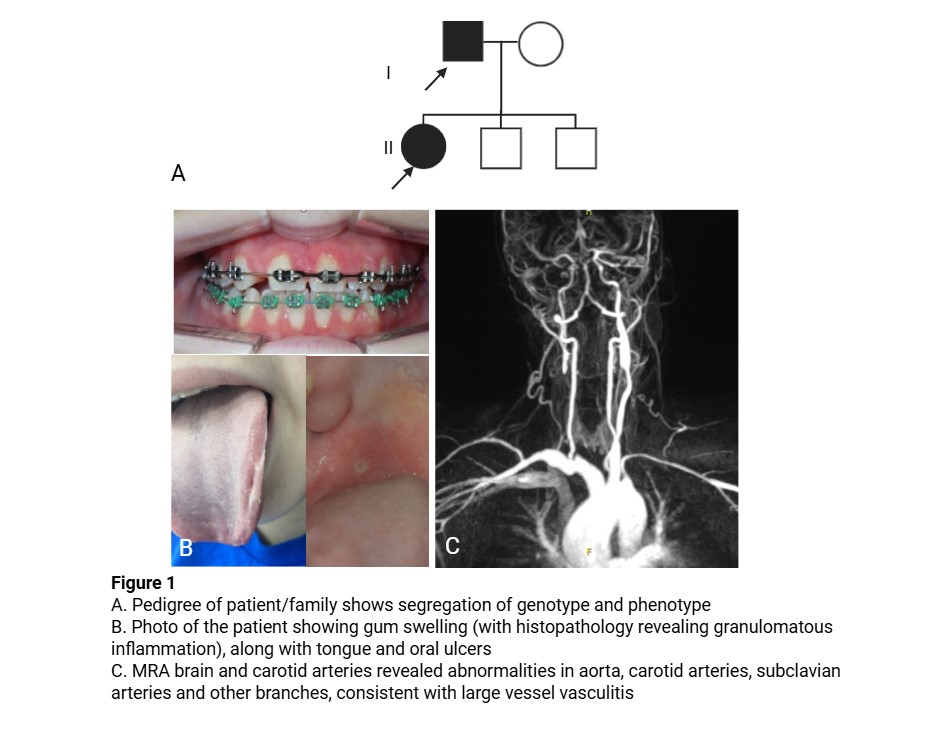Session Information
Session Type: Poster Session C
Session Time: 10:30AM-12:30PM
Background/Purpose: Loss-of-function pathogenic variants in TNFAIP3 lead to haploinsufficiency of A20 (HA20), a complex immune dysregulation disorder that can mimic Behcet’s disease, IBD, periodic fever syndrome, and varied other rheumatic diseases. This study, we describe a novel TNFAIP3 variant in an adolescent diagnosed with large vessel vasculitis.
Methods: A targeted genetic panel on the proband and parental single-gene testing were conducted by Invitae. Variant effect on canonical function was evaluated by NF-kB luciferase reporter (Cignal) in A20-deficient HEK293T cells transfected with empty vector, WT, and mutant TNFAIP3, and then stimulated with TNF-a. A20 protein expression was measured in primary cells using Western blot. NFkB and inflammasome activity in patient’s cells were evaluated after stimulating PBMCs (monocytes) with LPS or LPS+ATP for 2h or 24h. Then cytokine production (IL-18, IL-1b, TNF-a and IL-6 in pg/mL) was measured at each time-point, using clinical ELISA testing, and compared to data from 73 pediatric and adult healthy controls.
Results: The proband presented at age 16-year with chronic anemia, progressive oral ulcers, corneal ulcers, erythema nodosum, granulomatous gingivitis, and ultimately large vessel vasculitis involving thoracic/abdominal aorta and branches (Figure 1). She had history of hyperinflammatory skin reactions to injections/bug bites since age 2, and an episode of severe aseptic meningitis at age 5. Clinical genetic testing revealed a paternally-inherited heterozygous missense variant in TNFAIP3, c.1504C >T (p. Arg502Trp, NM_006290.3). The patient’s father reported a history of childhood onset oral ulcers, a self-resolving PFAPA-like syndrome, adult-onset psoriasiform rash, IBD, and arthritis (Figure 1).This variant has CADD score of 26.2 and REVEL score of 0.356. It is listed in ClinVar as a VUS and has an ACMG score of 5 (VUS), PM1, PM2 and PP3. In vitro, the variant was weakly hypomorphic (p = 0.04); basal A20 expression was normal in PBMC from patient and her father. Proband’s cells stimulated with LPS +/- ATP displayed enhanced production of TNF-a, IL-6 and IL-18 at 2 hours and 24 hours. For IL-1b, there was an increase observed at 24h after LPS stimulation and at 2h and 24h with LPS+ATP (Table 1). Consistent with this result, S100A8/9 were elevated in proband and her father. The proband’s cells also exhibited enhanced expression of Siglec-1, indicating Type 1 interferon activation. Expression of interferon-stimulated genes (ISG) was elevated in the proband and her father relative to healthy volunteers. Together, these data suggest acute and chronic activation of canonical NFkB, inflammasome, and Type 1 interferon signaling align with prior immunologic findings in TNFAIP3 loss-of-function variants.
Conclusion: The clinical phenotype, pedigree, and functional immune evaluation of the patient and her father provide evidence supporting a pathogenic role for the TNFAIP3 variant. Further, we extend the HA20 clinical phenotype to include large-vessel vasculitis. This case also underscores the essential role of comprehensive functional evaluation in interpreting novel VUS which is crucial for advancing our understanding of their impact on key biological pathways.
 Figure 1 Clinical presentation of the proband and the family pedigree
Figure 1 Clinical presentation of the proband and the family pedigree
.jpg) Table 1 Proinflammatory cytokine production from stimulated PBMC of the patient compared to healthy controls
Table 1 Proinflammatory cytokine production from stimulated PBMC of the patient compared to healthy controls
To cite this abstract in AMA style:
Panupattanapong S, Abraham r, Karri U, Lesmana H, Schwartz D. A Novel TNFAIP3 Mutation Associated with Large Vessel Vasculitis: Expanding the Phenotypic Spectrum of A20 Haploinsufficiency [abstract]. Arthritis Rheumatol. 2025; 77 (suppl 9). https://acrabstracts.org/abstract/a-novel-tnfaip3-mutation-associated-with-large-vessel-vasculitis-expanding-the-phenotypic-spectrum-of-a20-haploinsufficiency/. Accessed .« Back to ACR Convergence 2025
ACR Meeting Abstracts - https://acrabstracts.org/abstract/a-novel-tnfaip3-mutation-associated-with-large-vessel-vasculitis-expanding-the-phenotypic-spectrum-of-a20-haploinsufficiency/
